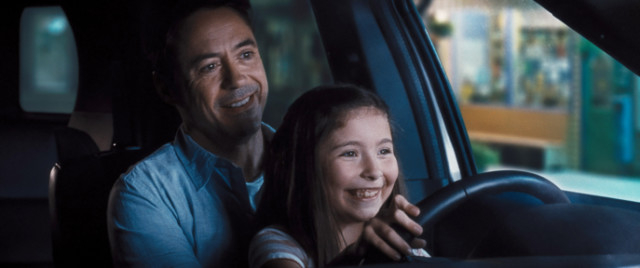
Early in The Judge, Hank Palmer, a hotshot Chicago defence lawyer played by Robert Downey Jr. with his usual fast-talking swagger, learns that his mother has died. He packs a bag, says goodbye to his unfaithful wife and his adorable daughter (Emma Tremblay), and jumps in his Ferrari.
He drives only as far as the airport, however. Even though his Rockwellesque hometown is in Indiana, just one state over, Hank decides to fly rather than drive. Presumably to save time — something this long, baggy, meandering film, directed by David Dobkin from a screenplay by Nick Schenk and Bill Dubuque, otherwise has very little interest in doing.
Once home, Hank rediscovers the family from which he’s been mostly estranged and runs into a few other people too, all of them played by fine actors encouraged to graze in a meadow overgrown with thickets of plot and clumps of easy sentimentality. Hank is the middle brother in a trio, flanked by Glen (Vincent D’Onofrio), a high school baseball star settled into middle-aged disappointment, and Dale (Jeremy Strong), who has the kind of mental disability encountered only in movies: He walks around with a Super-8 camera, asking naive questions that are alternately good for a cute laugh and preternaturally wise. He is less a sibling than a mascot.
The patriarch of the Palmer brood is the title character and the only reason to take an interest in this movie, since he is played by Robert Duvall. Judge Palmer (even his sons call him that) does not represent anything new for Duvall. He’s crusty, but with an occasional twinkle in his eye and a well-hidden soft spot. He is, more precisely, a collection of personality traits in search of a coherent character, which Duvall, by dint of sheer professionalism, comes very close to supplying.
What we know about the judge at the outset is that he was a domestic autocrat (a somewhat kinder version of the bad dad from The Great Santini) who doted on his wife and has been sober for nearly three decades. On the bench, he is stern but fair, tempering his reverence for the law with a sense of humour and an occasional display of mercy. He and Hank don’t get along, though the smart money will be on their eventual reconciliation.
Prodigal return
The road to that touching, fore-ordained moment passes through enough dramatic incident for three movies, none of them terribly original. For a while, Hank’s prodigal return is played for gentle, knowing laughs, as a comedy about a city slicker slumming it with the good country folk and rediscovering his roots in the process. He also rediscovers his high school sweetheart, Samantha, played by Vera Farmiga.
And then The Judge turns into a crime story, and a supershouty, macho-weepy, buried-family-secrets melodrama. A fellow just out of the penitentiary has died in a hit and run, and his blood turns up on the fender of the old man’s Cadillac. Guess who represents him in the murder trial that unfolds in his very own courtroom? (Actually Hank is the second choice, elbowing aside a local lawyer played by Dax Shepard, who hangs around to provide a touch of bumpkin humour.) The prosecutor is a vulpine outsider (Billy Bob Thornton) who turns out to have a score to settle with Hank.
Who doesn’t? Various secrets come dribbling out — about the paternity of Samantha’s daughter (Leighton Meester), about the car accident that ruined Glen’s baseball career and about the judge himself. They add up to a sprawl of narrative that is as unconvincing as the suspiciously sprawl-free, nostalgia-tinged town where it all takes place.








